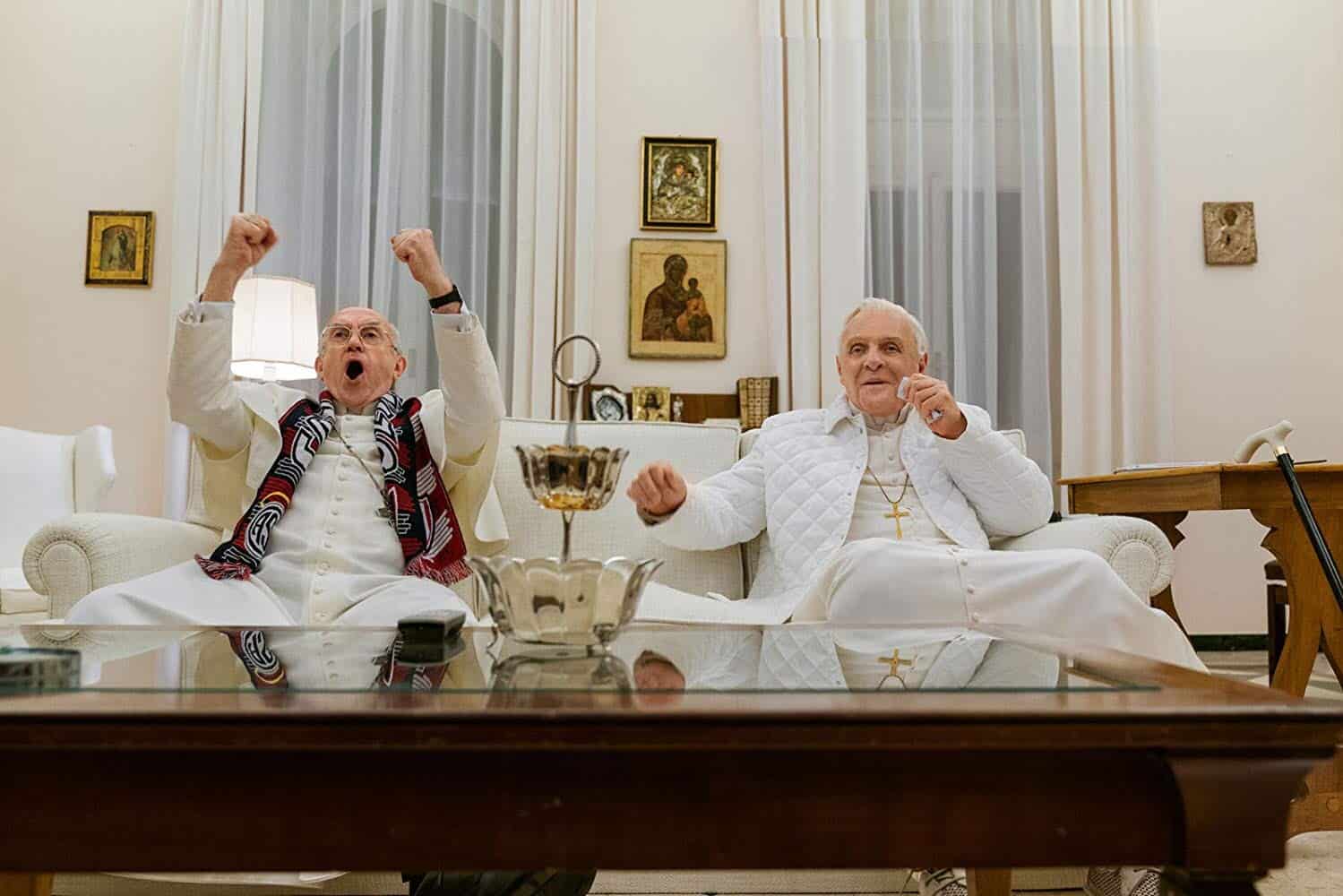Warning: This article contains spoilers
There is no doubt that Anthony Hopkins and Jonathan Pryce give such moving performances in The Two Popes. There were moments in the film when I thought I was actually looking at Benedict XVI and Francis themselves. At times, Hopkins channeled the child-like soft-spokenness of Ratzinger/Benedict. At other times, Pryce perfectly portrayed Bergoglio/Francis’ pastoral charm and even nailed his gait. The shots of the Sistine Chapel nearly had me convinced that we were spectators of the Papal Conclave in the actual Chapel. The only thing that kept me from believing that was the knowledge that media access to the Chapel is not easily granted, much less for the sake of filming a motion picture.
Yet what still has me turning this film over and over in my head is how director Fernando Meirelles gave this film multiple personalities. Put more bluntly, I think that the film has some “Jekyll and Hyde” aspects to it. I would call these aspects the “Hollywood touch” and the “human touch”. The “Hollywood touch” made the film frustrating to watch at times since it sought to insert drama where there would normally be none. I will enumerate my frustrations below. However, in those moments of the “human touch”, Meirelles turns the seemingly mundane into gold. Ultimately, the greatest gold that the viewer can mine, if she or he is paying close attention, is the invitation to peer into the humanity of these two great figures of the Roman Catholic Church. In their shared humanity, we glimpse a profound example in giving and receiving mercy and forgiveness.
Let me begin with the frustrating parts, which occurred mainly during the first 30 minutes of the film. Hopefully viewers pick up on the ‘Hollywood touch’ that was given to the Papal Conclave. I am referring to more than just the addition of the hit Abba song “Dancing Queen” that made the election sequence feel more like watching the unfolding of the election of Prom Queen. The intrigue displayed by the soon-to-be Benedict XVI, played by Anthony Hopkins, was a combination of cringe-worthy and laughable. To see Josef Ratzinger—one who is known for his mild-mannered comportment and timid personality—depicted as envious, condescending and panicky when he felt threatened by losing votes to two other men made me guffaw. All these details converted the Conclave from a solemn event of discernment into an intriguing drama worthy of the Borgias.
The meeting in the garden of Castel Gandolfo reminded me of the academic flare of the Dialogues of Plato combined with the drama of a Clinton-Trump debate. While the content of what the characters said is faithful to their respective sources, the way they are depicted in saying it caused me so much frustration. The condescension (or “shade throwing” you could say) that was exchanged between Benedict and Francis was far different the gentle manner that Ratzinger is known for, or the ever respectful way in which Bergoglio usually deals with Benedict.
I find that I am sensitive to how Benedict and Francis are portrayed in this film. I was in consolation as I heard the vocation story of Bergoglio. I was in consolation as I saw Benedict seated at the piano, laughing with Bergoglio, sharing his love for classical music. I was in desolation when I saw two men, known for their sensitive hearts, depicted as being so brusque with each other in their debates. I was in desolation as Benedict was admitting to an experience of a dark night of the soul during his papacy. I was in consolation when I saw the two Popes dancing. In short, I was being moved in some way by the fictional and the real humanity of these men portrayed on the screen.
As I was discerning through all the emotions that I felt during and after the viewing of this film, I realized that the desolation and consolation that I was experiencing came from the fact that I love BOTH of these Popes. Yes, I belong to the majority that has not been receiving much attention–the folks in the pews who have held no animosity against either Benedict or Francis. Now, that is not to say that I am blind to their deficiencies, as if both of these men were superheroes who can do no wrong; but there is a difference between healthy criticism and creating a straw-man that we metaphorically burn in effigy with our words.
The main difference is mercy and forgiveness. I was so moved—frankly, relieved—by the sequence that depicted an exchange of confessions between Benedict and Francis. If these two characters, depicted as ‘caricatures’ representative of views between two different ends of the pew, can forgive and absolve each other, perhaps even we can forgive each other in spite of our differences. We who have taken too quickly to the ubiquitous polarization of our society; we who have been prompt in pointing out the splinters in the eyes of others while ignoring the beams in ours; we who have forgotten how to enjoy together the simplest of joys like standing at a piano, watching a television show, or cheering for a soccer game—can even we perhaps absolve one another?
—
Image courtesy of IMDb, used under Fair Use Laws


